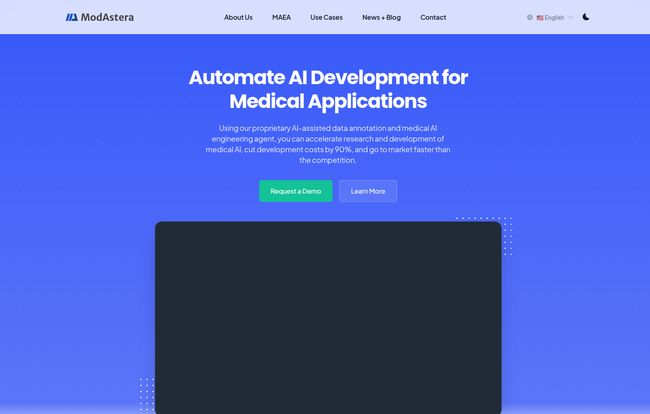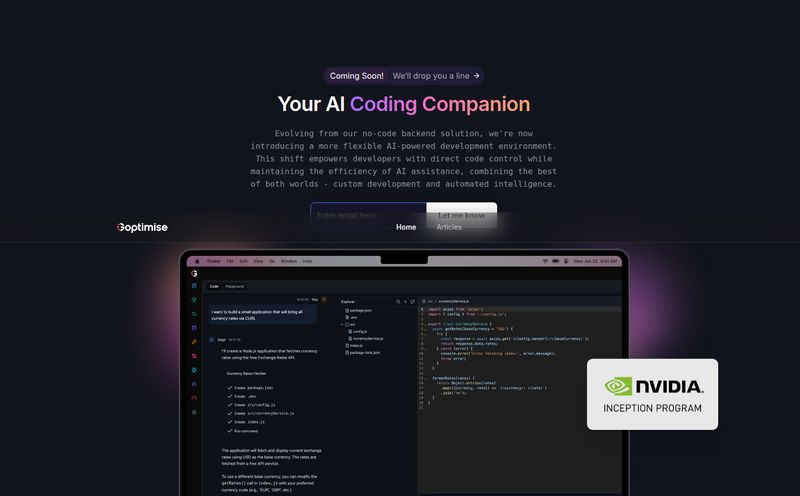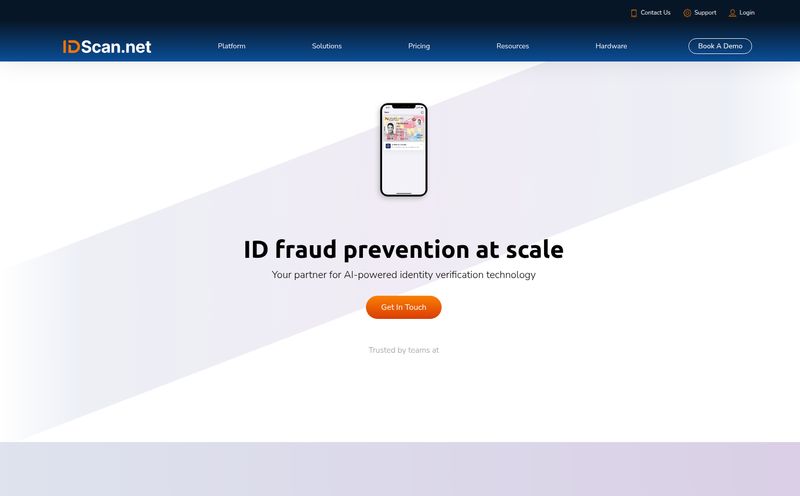For years, we've been hearing the promise of AI in medicine. It’s supposed to revolutionize diagnostics, personalize treatments, and basically change healthcare as we know it. And while we've seen some incredible breakthroughs, the honest truth is that getting a new medical AI application from a brilliant idea to an actual, usable tool is... well, it’s a slog. A long, expensive, and ridiculously complicated slog.
I've been in the tech and traffic game long enough to see a hundred platforms promise the world. But the healthtech space is a different beast entirely. You’re not just building an app; you’re building something that has to navigate a minefield of regulations like HIPAA, handle incredibly sensitive data, and be clinically accurate. The research and development cycle can stretch for months, sometimes years, burning through cash faster than a rocket. It's a high-stakes game that has kept a lot of amazing innovation on the sidelines.
So, when I stumbled upon a platform called ModAstera, my curiosity was definitely piqued. Their headline claim is bold. In fact, it’s one of the boldest I've seen: Automate medical AI development, slash R&D cycles from months to days, and cut costs by up to 90%. That’s not just an improvement; that’s a complete paradigm shift. But is it for real? Let's take a look.

Visit ModAstera
So What Exactly Is ModAstera?
At its heart, ModAstera is a specialized platform with a brain, a “Medical AI Engineering Agent” (or MAEA, for those who love acronyms). Think of it less as a simple set of tools and more like a dedicated, automated engineering team that lives in the cloud. Its entire purpose is to take on the heavy lifting of building, testing, and deploying AI models specifically for medical use cases.
For anyone who's ever tried to get a project like this off the ground, you know the pain points. You have the data preprocessing, the mind-numbing task of data annotation (more on that later), building the actual model, optimizing it, validating it, and then deploying it in a secure, compliant environment. It’s a chain of highly specialized, time-consuming tasks. ModAstera’s goal is to wrap that entire, messy workflow into one integrated system. It's an ambitious idea, and if they pull it off, it could genuinely lower the barrier to entry for so many organizations.
The Core Components Powering the Platform
A big claim needs some serious firepower to back it up. From what I've gathered, the platform's power comes from a few key components working together.
The MAEA: Your AI Engineering Co-Pilot
This is the star of the show. The Medical AI Engineering Agent isn't just a fancy name. It’s designed to automate some of the most complex engineering work. This includes things like building models for segmentation (like identifying a tumor in an MRI scan) or classification (like categorizing skin lesions). It handles parameter optimization, which is often a trial-and-error process that can eat up weeks of an expert's time. The agent simplifies the creation process, turning what was once a deep-code problem into something far more manageable.
AI-Assisted Data Annotation That Doesn't Make You Want to Cry
Anyone in the AI field will tell you that 80% of the work is in the data. And a huge chunk of that is annotation—the painstaking process of labeling data so the AI can learn from it. For medical images, this can mean a radiologist spending hundreds of hours drawing precise outlines on scans. It's slow, expensive, and a major bottleneck.
ModAstera’s approach here is pretty smart. It uses AI to help with the annotation itself. The system can pre-label data, giving the human expert a head start. Instead of drawing from scratch, they're refining and correcting the AI's suggestions. The platform has customizable workflows and templates built for healthcare, which is a nice touch. This doesn’t just speed things up; it can also lead to more consistent, higher-quality labeling. A true win-win.
A Library of Pre-Built HealthTech Models
Why reinvent the wheel every single time? ModAstera comes with a set of pre-built AI models tailored for common healthtech jobs—think diagnostics, patient monitoring, or medical imaging analysis. I like to think of these as high-quality starter templates. You're not starting from a blank page. You can take a model that’s already 80% of the way there and adapt it to your specific dataset and needs. This is a massive accelerator, especially for teams that might not have a platoon of PhDs on staff.
A Unified Platform with Compliance Baked In
This might be the most important part for any real-world application. The platform integrates everything from data prep to final deployment. But the secret sauce is the built-in compliance for regulations like HIPAA in the US and APPI in Japan. Navigating this regulatory landscape is a nightmare for developers. Building these guardrails directly into the platform removes a huge source of cost, delay, and legal anxiety. It means the solutions you build are designed from the ground up to be secure and ready for integration into actual clinical workflows. They also mention real-time monitoring, which is critical for maintaining performance and safety after an AI model goes live.
Who Should Be Paying Attention to This?
The website says it’s for everyone from beginners to experts, which can sometimes be a red flag for a product that ends up pleasing no one. But here, I think it makes sense.
For a healthtech startup, this could be a lifeline. It dramatically reduces the upfront investment in both cash and specialized talent needed to build a proof-of-concept. For a hospital or research institution, it empowers clinicians and researchers—the people with the actual medical insights—to be more directly involved in creating tools without needing to become full-stack developers. It essentially bridges the gap between medical expertise and engineering execution. And for established MedTech companies, it offers a way to seriously accelerate their R&D pipeline and innovate more quickly.
The Big Question: What About the Price?
As is pretty common with specialized, enterprise-grade B2B platforms, ModAstera doesn't list its pricing publicly. You won't find a neat little table with 'Basic, Pro, Enterprise' tiers. This usually means the pricing is customized based on the scale of use, the features needed, and the level of support required. To get the numbers, you'll need to schedule an introduction or a demo through their site. Honestly, for a tool this specialized, that's the approach I'd expect. You're not buying a simple app; you're investing in a development infrastructure.
My Final Thoughts on ModAstera
Look, I'm naturally skeptical of massive claims, but what ModAstera is proposing is genuinely exciting. The bottlenecks they're targeting—R&D time, cost, data annotation, and regulatory compliance—are not just minor inconveniences; they are the primary barriers holding back a wave of medical innovation. It's a focused solution to a very real, very expensive problem.
The combination of an automation agent (the MAEA), AI-assisted data tools, and baked-in compliance makes for a compelling package. It feels less like another general-purpose AI tool and more like a purpose-built factory for creating next-generation medical technology. While I haven't run a project on it myself, the entire concept is incredibly sound. If the execution matches the vision, ModAstera could be one of those quiet companies that ends up having a massive impact on an entire industry. It's one I'll be watching closely.
Frequently Asked Questions
- What exactly is a Medical AI Engineering Agent (MAEA)?
- The MAEA is ModAstera's core automation engine. It's an AI system designed to handle the complex technical tasks of building and deploying other AI models for medical purposes, like optimizing their structure and parameters, which significantly speeds up the process.
- Is ModAstera only for expert AI developers?
- No, it's designed for a range of users. While AI experts can use its full capabilities, its automation and pre-built models allow beginners, like clinicians or researchers with limited coding experience, to develop sophisticated AI solutions as well.
- How does ModAstera handle data privacy and compliance?
- The platform is built with healthcare regulations in mind. It has built-in compliance for major standards like HIPAA (for the U.S.) and APPI (for Japan), ensuring that data is handled securely and that the resulting AI applications are designed to meet these strict requirements from the start.
- Can I use my own proprietary data with the platform?
- Yes. The platform is designed to work with your specific data. A key feature is its AI-assisted data annotation tool, which helps you prepare and label your own datasets (like patient records or medical images) quickly and accurately for model training.
- What kinds of medical applications can you build with it?
- You can build a wide array of applications, primarily focused on diagnostics, medical image analysis, and patient monitoring. Examples include models that can identify anomalies in X-rays or MRIs, classify different types of cells, or monitor patient vital signs for early warnings.
- How do I find out how much ModAstera costs?
- Pricing information is not publicly available. You need to contact the ModAstera team directly through their website to schedule a call or demo, where they will likely provide a custom quote based on your organization's specific needs.
Conclusion
The journey from an idea to a compliant, effective medical AI tool is notoriously difficult. ModAstera presents a compelling argument that it doesn't have to be. By automating the heavy engineering, simplifying data preparation, and embedding compliance from the very beginning, it offers a path to faster, more affordable, and more accessible innovation in healthtech. It's a bold vision, and one that our healthcare system desperately needs.



